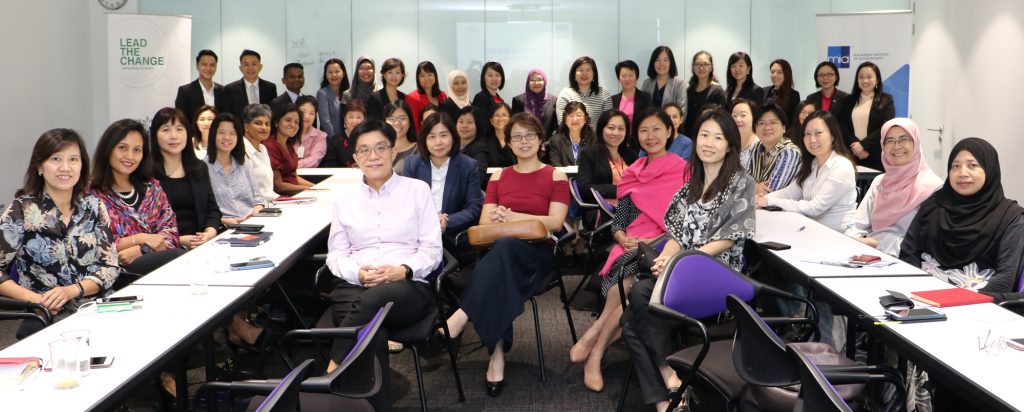
By Anis Ramli
Accountants and CFOs are well positioned to take up leadership on Boards because they are well-versed in aspects such as regulatory, risk management and corporate governance, and backed by codes of ethics that espouse integrity and accountability. Now that women make up about half of the profession, it is high time that Board composition reflects gender diversity and inclusivity.
The Malaysian Institute of Accountants (MIA) recently hosted a sharing session aimed at onboarding more women, delivered by the 30% Club representatives. The 30% Club is a business campaign to help drive higher women representation in leadership positions and on corporate Boards, and it aims to help Malaysia to achieve 30 per cent women representation on public-listed corporate Boards by 2020.
Forty-five C-Suite female MIA members attended the sharing session, which was presented by the 30% Club’s Project Management Officer, Marzida Mohd Noor, and members of the talent pipeline committee, Pun Tian Pouw (better known as TP), Principal, TP Pun Advisory and Raj Kumar Paramanathan, Partner, Malaysia & Thailand, CnetG Asia. Participants also had the opportunity to discuss challenges faced by Board members but more importantly, they learnt how to self-assess their skill sets to increase their opportunities for Board appointments and increase Board readiness. Some of the key skills and success factors emphasised by the 30% Club were:
Visibility. Learning how to build networks and connections is critical for Board visibility. While recent studies suggest that Board recruitment practices are undergoing some modification, the fact remains that suggestions of names for new directors continue to come primarily from the traditional sources – the CEO and current Board members. Hence, women need to make themselves visible and also more accessible. This includes reading up a lot on varied subjects and timely topics and issues and sharing their professional points of view so others take notice of them.
Get A Buddy, A Coach and A Sponsor. Women do not believe that networking is important for their success. This is also supported by some studies,” said Raj. Having a male buddy helps give the woman that initial nudge out the door while networking, bringing down the barriers, especially in engaging positively with male members. A buddy is different from a sponsor and a mentor and a buddy will help you build and grow your network. A mentor provides advice and support around building skills and qualities to navigate successfully in the organisation. A sponsor sees you as their protege and talks about you without being solicited. They will suggest you for Board or senior leadership positions, pay raise or promotion because they believe in you. It also finesses access to other powerful networks. The bottom line is, said Raj, women considering Board or senior leadership roles should increase visibility and build rapport with sponsors and mentors in their career, ideally both male and female.
Be Prepared to Commit. To be considered for Board, TP suggested that women share the fact that they are available, capable, and interested in a Board position. “Find the right balance between getting the position you aspire while not seeming over-eager or desperate in the process.” And be discerning about the roles you accept; do not over-commit as this may adversely affect your contribution level. Realise too that there will be Board opportunities that may not fit you well, but do not despair. The right fit may eventually come along.
Brand You. You are your most vital asset. TP recommended getting acquainted with “headhunters who deal at the C-Suite/Board level who is knowledgeable of the industry ecosystem.” . Be self-aware and strategically articulate an effective personal branding. “Do not underestimate selling yourself with a well-presented LinkedIn profile,” TP advised. A good profile, he says, should not just give a general overview of your experiences and competencies, but also should articulate how you are able to contribute and achieve more in your future endeavours. “Do consider putting in LinkedIn your aspiration to be a Board member. This may assist some headhunters who do keyword searches such as “telco” “Board”, “CFO”. So if your LinkedIn does not have the significant keyword “Board potential”, your name may slip through the crack.”
Dynamics Every Board is a social enterprise. Women inducted into Boards may be seen as an “outsider” in the beginning, hence they must be prepared to rearrange social bonds and open up closed ties that may have long been established. This is when you show what you can bring to the Board, they concluded.
But it takes two to tango. Aspiring women can’t do all the work by themselves. Marzida said that working toward Board gender equality also requires aligning corporate culture and values with gender diversity. “The tone at the top must change, and the organisation’s governing authorities must believe in the diversity agenda.” To this end, the 30% Club has approached the top 100 PLCs’ Chairmen and some Board members, inviting them to be part of roundtable dialogues that can enable women and men to succeed professionally. This includes addressing stereotypes and unconscious biases and how to become champions of change to create a more inclusive environment.
What Women Thought. The women who attended found the session highly useful in clarifying the pathway to Board membership.
Josephine Phan Su Han, Senior Executive Director, Pricewaterhouse Coopers said, “The most engaging and valuable part of the session to me was the journey through a self reflection of the qualities, qualifications and skills that make women equally qualified for Board roles. That was very inspiring and encouraging and I think to a number of other participants in the session too.”
On whether the session helped boost their confidence on pursuing Board roles, Ang Hwui Tee, Head of Credit Analysis, HSBC said, “It certainly got me to think more on suitability, the right fit, board composition and the value I can bring to the Board should an opportunity present itself.”
Concurring, Siva Yamini Sivaperuman, Head Screening, Standard Chartered Global Business Services welcomed the insights on “what is required to be on Board and how women can make a difference to Board composition.” Kwek Yeang Ching, Senior Consultant, Asian Banking School Sdn Bhd, said the sharing of experiences by members who are already onboarded as women directors was particularly interesting and it boosted her confidence to be part of the 30% club.






